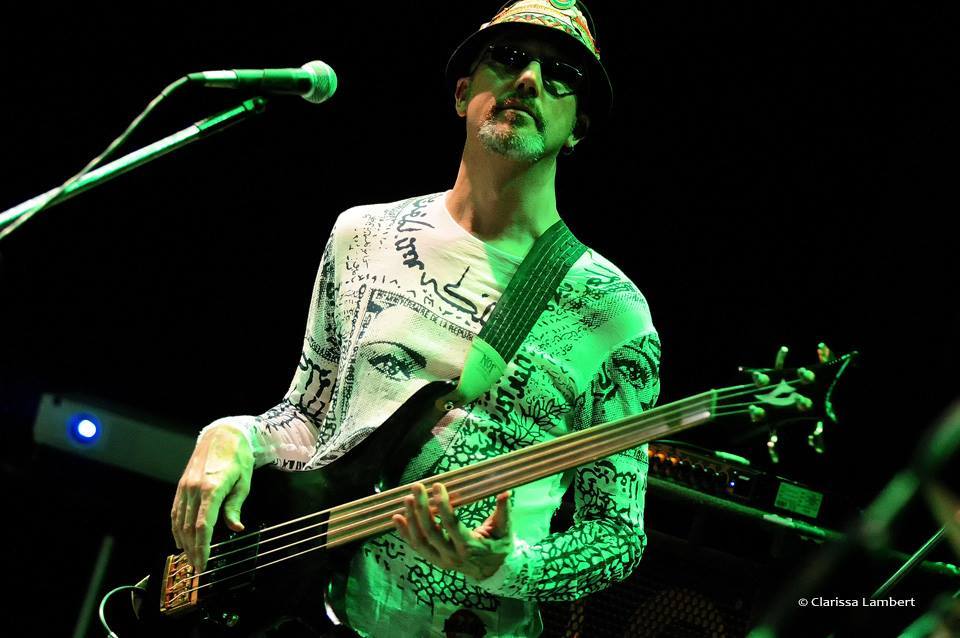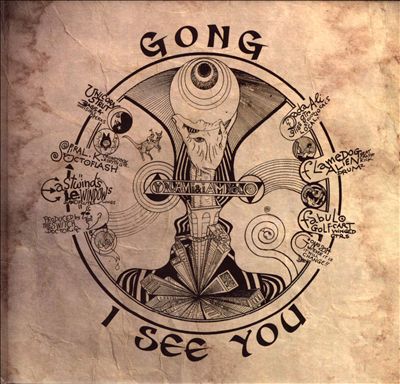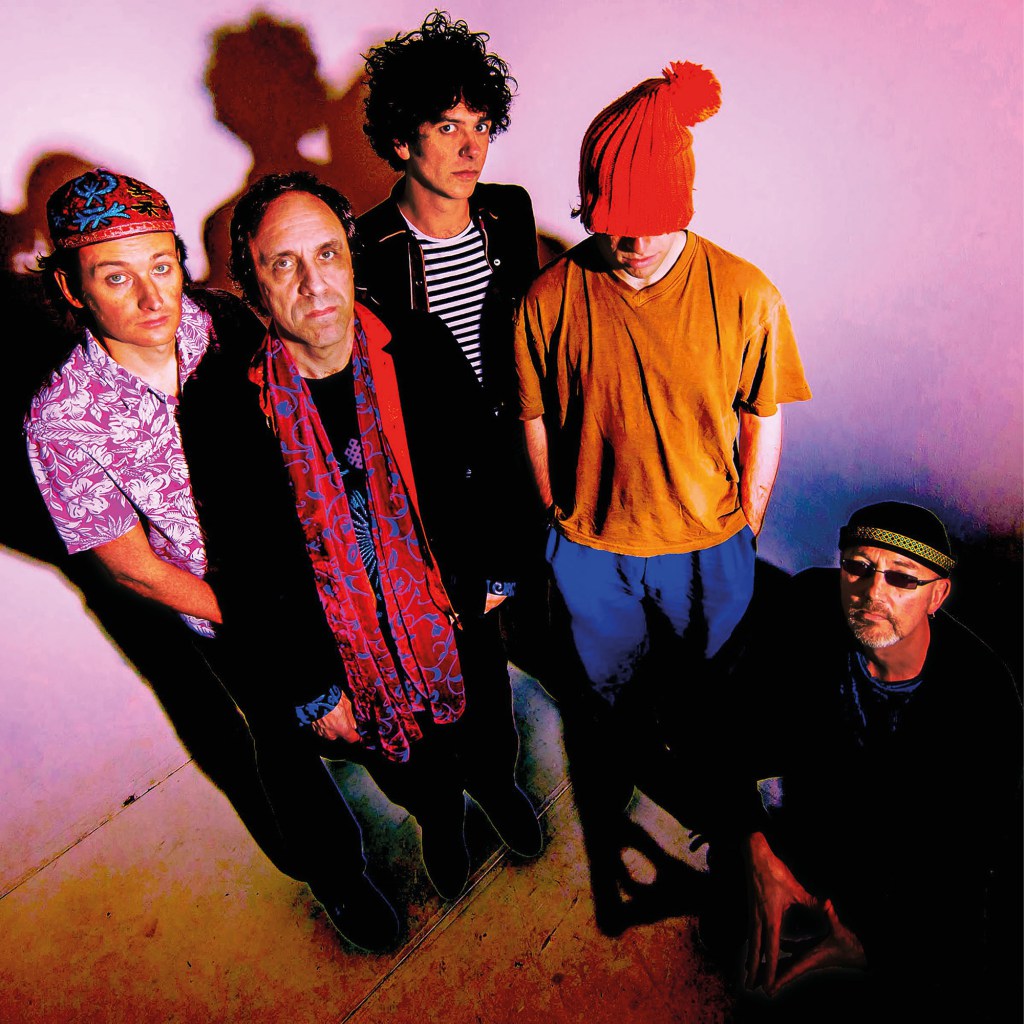Dave Sturt, Gong, on „Rejoice! I’m Dead!“
»Gong really is a continuing collective«

Gong, it is widely accepted, is „an endlessly evolving parable“. But some things do end occasionally. Just after the news of Gilli Smyth’s death made the rounds we had the chance to talk to Dave Sturt, bassist, singer and „gatekeeper“ of their latest and fascinating album „Rejoice! I’m Dead!“ (eine übersetzte Kürzestversion dieses Interviews findet sich in der Oktober-Ausgabe des Classic Rock-Magazins)
Condolences to the loss of Gilli Smyth, „Mama Gong“!
Thanks. She was an extraordinary tour de force, extremely bright; knowledgeable; stubborn; infuriating; and charming – she was a real powerhouse with a unique approach to music, art and life in general.
She was an inspiration to many free thinkers around the world and she will be sorely missed.

The bio gives details about how daevid encouraged your carrying on without him due to his illness and how he issued his blessing. Was there still contact to Gilli?
Gilli was already ailing on our last European tour in 2012. She missed several gigs on that tour. We ended that year with some performances in Japan, which was the last time that Gilli played on stage with us.
Her health deteriorated more throughout 2013 – while we recorded the album „I See You“. The final track on that album – ‚Dingo Virgin & Shakti Yoni‘ turned out to be her last recording with the band.
Do the people who are in Gong today have contact to former band members?
Yes – Gong really is a continuing collective. All of the previous band members are still very close and supportive.
Steve Hillage is the person I speak to most. He has a very clear understanding of the business and is a really lovely bloke as well as being a fabulous musician. We are also in close contact with Mike Howlett, Miquette Giraudy, Didier Malherbe, Keith the Bass and Graham Clarke.
»Gong has always been a counter-cultural group«
The bio speaks of a continuity in Gong’s „Music and ideology“. How would you describe the latter?
The underlying ideology is all about confounding expectations and questioning normality. daevid and Gilli formed Gong in a very turbulent time in French history. They captured the mood of the student riots in 1968 and set about challenging the safe musical and artistic norms. Gong has always been a counter-cultural group, always avoiding the mainstream. That spirit, combined with a mystical search for meaning, created the backbone for what Gong has been and continues to be.
You’ve been a member since 2009 now. What was the biggest change musically since then?
Looking back on it, it seems as though everything I had done up to 2009 was preparing me for my journey into Gong. I had flirted with many types of music and have always followed my instincts – never chased the mainstream – which is probably why I’m still poor! I joined just as the album ’2032’ was released. Steve and Miquette had recently rejoined and the band direction had shifted into more of a dance oriented culmination of the Pot Head Pixie story.The set consisted of tracks from the new album plus many classic tracks from Camembert Electric and the trilogy (Flying Teapot, Angel’s Egg and You)
Steve and Miquette left in 2011 to refocus on System . daevid was keen to keep Ian East and myself as the core of the band and introduced Orlando (his son) on drums and Fabio Golfetti on guitar for the tour in 2012. This had a harder edged sound that suited daevid’s mood and it then led on to the „I See You“ album.
Two years ago the voice of Gong changed considerably through Kavus Torabi joining the teapot. Would you agree? Any comments?
It feels as though the seeds of Kavus Torabi’s entrance into Gong were sown many years ago. He had been a „fan“ (I never like to use that word in relation to Gong – it never sits right) since his awakening in his mid teens. He played with his fair share of cult bands (including Monsoon Bassoon and Cardiacs) and then, in 2012, I I contacted Steve Davis on the Interesting Alternative Radio Show to propose an interview with daevid. That led to daevid meeting Kavus (the co-presenter of the show) and a melding of fellow space travellers ensued.
A year and a half later we toured Brazil with Kavus in the band and it was uncanny how well he fitted in – he was like an amalgam of everyone who’d ever been in Gong – with an energy and drive that was totally inspiring to all.
daevid had been talking for a few years about the idea of Gong continuing after him, which had seemed pretty unlikely, but now, with Kavus it seemed possible.
daevid was diagnosed with lymphoma after that tour and later in the year we played our first gigs without him to support the release of the „I See You“ album. We were nervous about what the response would be but we were also totally convinced that this was a stunning band. Whether daevid had truly foreseen what was to come and had deliberately gathered the players to take it on to a new level or it was complete happenstance is hard to say – but we knew that we had found an extra-ordinary musical connection and a stage on which to perform. The response from audiences was overwhelming.
Of course the sound of the band has changed. „I See You“ was composed by this line up substantially, along with daevid, and it was hailed by many to be on a par with the 70s trilogy. There is no way that we could, or should, try to imitate what daevid would do. The only route was to do what Gong has always done – follow it’s instincts and see what happens.
Thank you. The Album then – Congrats on another charming Gong experience! The Credits read „Overseer and Gatekeeper – Dave Sturt„. What does that actually mean?
The process of recording has changed radically over the last few years. I’m sure that most people will know that most bands now can’t afford to spend months in a recording studio and technology has moved on to the extent that records can now be made remotely. We spent several weeks working together in a rehearsal studio – composing and arranging and then recorded all of the drums and guide tracks at Brixton Hill studios. We then all worked in our home studios to complete our parts. All of the parts were then sent to me to to do rough mixes – which meant editing, re-arranging, sorting formats etc. I then passed all of the files on to Mark Cawthra for the final mix. I then kept an overseeing eye over the whole process to get everything finished for Madfish’s release schedule.
»Death, to daevid, was something to embrace – a step along the way to enlightenment«
‚Rejoice!‘ indeed has a happy ring to it. Although it seems to change its character a bit from a singalong composition to a jam – would you agree?
Yes, I guess it does! That’s just how it came together in the rehearsal room. The inspiration for this track – and hence the album – came from a poem of daevid’s – „All I Ask“. The lines „Rejoice! I’m Dead! At Last You’re Free.“ summed up daevid’s attitude. Death, to him, was something to embrace – a step along the way to enlightenment.
»Gong has never shied away from dark and menacing«
‚Kapital‘ has a very different atmosphere – frightening, frightened perhaps. Had Ian East a major part in the composition of this one?
No – this is substantially composed by daevid. While we were putting „I See You“ together, daevid had a burst of creativity, despite his health problems, and he presented us with several ideas that, for one reason or another, weren’t developed. ‚Kapital‘ was one of them. Also, in the early stages of compiling ideas for „Rejoice! I’m Dead!“ Fabio sent through five demo ideas – one of which fitted perfectly with daevid’s demo.
Gong has never shied away from dark and menacing! See ‚Dynamite/I am Your Animal‘ on Camembert Electric for instance.
Both the charming ‚Model Village‘ (daevid’s Anarchy Manifesto, the credits prompt) and ‚Beatrix‘ seem to use samples. Whose are those voices on „Beatrix“?
There are two lines at the beginning of Model Village from daevid’s rendition of „Floating Anarchy Manifesto“ (another example of his late creative burst) – they seemed to fit very well with my lyrics for Model Village – a reflection of a potentially perfect society twisted by greed. Much like reality then.
‚Beatrix‘ came from a creative late night session at an apartment in Brazil. daevid improvised words over a tune of mine – I just happened to be recording on my handheld. He is speaking of an old girlfriend who we met when we played in Erce in the French pyrenees.
Do you use a Double Bass on this one? It gives such a warm „Tom Waits“ Jazz feeling to the song! Which model? Has it got pickups or is it miked?
Ha – no – it’s actually my Eko fretless acoustic bass miked with a Rode NTK valve mic.
Speaking of bass guitars – for „Unspeakable“ you also used a fretless model? Which one? Which amps do you use?
We are getting pretty muso now! All of the tracks – apart from ‚Kapital‘ and ‚Beatrix‘ – feature my Vigier Passion delta metal fretless – it’s a pretty unique instrument. I’ve had it for about 30 years now. Also, you may not have realised that, a lot of the atmospherics on the album are produced using Ebow on this bass. It’s a pretty unusual sound.
‚Unspeakable‘ seems to change from Jazzrock to just plain rock after minute four – how come?
All of the tracks came together in the rehearsal room with ideas from every member contributing to the whole. ‚The Unspeakable Stands Revealed‘ was the first whole track that then showed the way for the rest. It began with that opening bass line which Kavus then added to and he then came up with the next section that leads into the verse and it eventually falls into a chord sequence from Fabio rhythmically mangled by Ian and Cheb< Nettles.
Is that a mellotron we hear on „Restless Seas“?
I’m not sure which sound you mean – it’s certainly not a Mellotron. It could be my fretless – pitch shifted up an octave or two – or Didier’s duduk – or Fabio’s gliss guitar!
I think I recognise Kav’s voice a couple of times but who sings lead (and harmonies?) on ‚Insert Yr Own Prophecy‘?
The lead vocals are Kavus. The backing vocals are mainly Cheb. He is an astounding musician – as well as being a drummer! He’s one of those guys who plays most instruments annoyingly well and has bat-like ears.
Lovely walking bass on this one! And again a happy sounding tune.
Yep – it’s fun to play but was a tough one to compose/arrange. It came substantially from an idea of Chebs. You can pick up the sound of my Ebow fretless at the beginning of the spaced out mid section.
You played w/ people as diverse as Theo Travis and Clannad. Who was your most fascinating partner so far?
Ha! yes, as you see, everything feeds into Gong. ‘Fascinating’ ? – apart from Gong – I’d have to say Bill Nelson. He was a big influence on my early career, both with Be Bop Deluxe and Red Noise and it was fabulous to play with him. . . . and then to have him play on my solo album was completely mind blowing!
Why did you choose Andy Jackson for mastering duties?
Andy and I used to share a house for many years back in the 80s. We hooked up soon after I’d moved to London and I was able to shadow him while he engineered with Pink Floyd and related artists. It was a fantastic education for a lad from the North.
He is an exceptional sound engineer, great musician and a sterling chap.
Why did you mix ‚Beatrix‘ and ‚Visions‘?
Since I put those tracks together from beginning to end it seemed to make sense to also do the final mixes. ‚Visions‘ began life as an improvised Gliss guitar track from Fabio. I then composed the melody on the Ebow bass again, then Ian and Kavus provided some lovely textures.
Would you like to comment a bit on the „Extras“?
Having the extras disc – which will be available with the 12” book edition – gave us the opportunity to give some background to some of the tracks and also to feature one track that didn’t make the album.
We agonised over ‚Someone You’ll Never Be‘. It’s a beautiful track – and some say it should have been the last track on „Rejoice! I’m Dead!“ Perhaps it will be on a re-release.
daevid’s Floating Anarchy Poem is here in it’s entirety – as are the demos that made up ‚Kapital‘.
There are also some live recordings – there are two tracks from the first rehearsal we had with Kavus and there is also a track from the Inspiral Trio – which comprises <Ian, Kavus and myself – spontaneously composing in front of a live audience.
»There is always going to be the ’no daevid, no Gong’ camp«
What is on the roadmap now for Gong?
I guess that all depends – I hope we’ll be able to continue to explore this new landscape that we’ve found ourselves in. We are in an extraordinary position. We are in a band with a fabulously rich heritage, with a loyal and enthusiastic following and yet, we are a new outfit. We have a remit from Bert Camembert himself to continue the tradition, and the ongoing support of other past members. There is a resurgence of interest in the psych rock scene – we’ve seen many more teenagers and twenty somethings coming to see Gong. It’s a legendary name and we are five inspired and motivated musicians who have been left the honour of continuing the story. Bring it on!
We completely understand people being critical or suspicious – there is always going to be the „no daevid, no Gong“ camp. But Gong has always been different to other bands – it feels more like a movement than just a group of musicians. We intend to keep the spirit alive and we know that there are many enlightened folk out there who are with us all the way…

Gong – „Rejoice! I’m Dead!“
(59:56, CD, Madfish/Edel, 2016)
Bewertung: 12/15 Punkten
Surftips zu Gong:
Homepage
planetgong.co.uk
Homepage Dave Sturt
Facebook
Twitter (Gong)
Twitter (Dave Sturt)
YouTube
Bandcamp (Gong)
Bandcamp (daevid)
Soundcloud
Spotify
Madfish Music
Prog Archives
Wikipedia
Pictures: Gongband.net
Live pic Dave: Clarissa Lambert
Band pic : Ashley Jones
All english interviews on BetreutesProggen.de
Eine übersetzte Kurzversion dieses Interviews findet sich in der Oktober-Ausgabe des deutschen Classic Rock.

